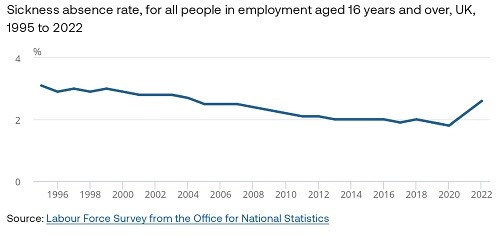Employers have a crucial role to play in reducing alcohol harm among their staff, through approaches such as education, confidential support and ending the stigma about seeking help for a problem with alcohol.
Features
Why employers need to rethink the workplace alcohol culture
“Just have a drink!”
The UK has long held the reputation for being a nation of boozers. From the ubiquitous lunchtime pint, the ‘90s work hard, play hard mentality and, more lately, the mummy wine memes on social media, it’s impossible to avoid soaking up alcohol marketing messages that tell us we need alcohol to de-stress, that we deserve a drink at the end of the working day, and that alcohol is a treat to look forward to.
Look beyond the marketing though, and there are some sobering statistics that suggest alcohol is costing many of us more than just money. In this article, we’ll explore the true impact of alcohol on our workforce and set out some best practice that progressive employers are already putting in place to help their employees to find a healthier relationship with their old friend, alcohol.
Alcohol and workers’ health
According to Alcohol Change UK, around 17 million working days are lost to alcohol each year at a cost of £1.7 billion. With sickness levels at a 20-year high at 2.6 per cent and depression and anxiety topping the table of reasons for long-term absence (see Figure 1 below), progressive employers are beginning to understand that supporting people to have a healthier relationship with alcohol could have a significant impact on their workers’ health and wellbeing.
 Source: Labour Force Survey from the Office for National Statistics
Source: Labour Force Survey from the Office for National Statistics
The elephant in the wellbeing room
Yoga, meditation, sleep hygiene, healthy eating, fitness, movement, financial wellbeing, menopause awareness: you name it, you’ll find it on most corporate wellbeing programmes. Alcohol, however, rarely gets a mention, outside of signposting to Alcoholics Anonymous (AA) if you have a ‘problem’, and we don’t talk about that, do we?
The irony is that alcohol can unravel every single aspect of your wellbeing: physical, mental, financial and relationship health are all at risk when we drink to excess on a regular basis. Isn’t it time for us to address the elephant in the wellbeing room?
Worker safety
Perhaps more alarming than absence rates is the latest data on hangovers at work from Aviva. A third of employees admitted to having been to work with a hangover, 10 per cent reported hangovers at work once a month, and five per cent once a week. Participants reported that, when hungover, they would suffer from poor concentration, feeling tired to the point of being very sleepy, doing the minimum work possible before going home and making mistakes which they later needed to rectify.
 Employers are uniquely placed to implement anti-stigma activities, such as sharing lived experience stories, which help others to understand that they are not alone in having these difficulties with alcohol. Photograph: iStock
Employers are uniquely placed to implement anti-stigma activities, such as sharing lived experience stories, which help others to understand that they are not alone in having these difficulties with alcohol. Photograph: iStock
Cross referencing these findings with data indicating a high incidence of alcohol dependency in safety-critical industries, such as construction, mining and medicine, it seems clear that alcohol is a significant risk factor for many businesses.
The Institute of Alcohol Studies estimates that 40 per cent of workplace accidents are alcohol-related, and cites alcohol as a leading cause of grievances and disciplinary procedures, with around half of all sexual harassment claims being alcohol related.
Grey area drinkers
Drawing upon my own experience, I know that asking for help with alcohol use isn’t easy. Coming to the realisation that my repeated attempts to ‘drink responsibly’ were not working felt very dark and lonely. It seemed to me that everybody else could drink ‘normally’, so why couldn’t I? Feelings of shame and self-criticism crept in. The fear of being labelled an alcoholic and of the ensuing stigma kept me locked in a silent battle of drinking more than I was happy with for many years.
There are millions of people who, like me, are holding down good jobs, paying the mortgage and raising children. They would never consider going to AA or accessing traditional alcohol services.
These ‘grey area drinkers’ (i.e., people who are unhappy about how much alcohol they drink, but are not physically addicted to alcohol) are in every workplace. In fact, the higher up the pay scale you are, the more likely you are to fall into this category.
It is also the space in which employers can make the most impact in reducing alcohol harm – to their workforce, to the friends and families of their employees, and to the wider community. Education and training on topics such as how alcohol works, the dangers of excessive drinking, and practical tips to help you take a break from alcohol can make a real difference.
 ‘Grey area drinkers’ are people who are unhappy about how much alcohol they drink, but are not physically addicted to alcohol. Photograph: iStock
‘Grey area drinkers’ are people who are unhappy about how much alcohol they drink, but are not physically addicted to alcohol. Photograph: iStock
Not only that, employers are uniquely placed to implement anti-stigma activities, such as sharing lived experience stories, which help others to understand that they are not alone in having these difficulties with alcohol, and to help people find the resources and support they need, before they get anywhere near to needing traditional alcohol services.
Effective policy
Research by the CIPD estimates that over a third of employers are operating without an alcohol policy in place. Those that do have a policy tend to focus on the disciplinary procedures that should be followed if someone is found drinking on the job, with little to say about the support that is on offer for anyone disclosing an alcohol use issue. Taking a punitive approach is likely to perpetuate the silence and stigma that prevents people from seeking help.
Instead, a good alcohol policy should state clearly what the expectations are when it comes to alcohol in the workplace. Clear boundaries of what is and isn’t acceptable at workplace events, and any exceptions to the rules, are a minimum requirement.
Employers should also set out their approach to support employees who disclose any alcohol use issues, making reference to any line manager training, alcohol education, sober coaching, occupational health, employee assistance programme (EAP) or privately funded support.
The policy should also stress the importance of confidentiality and reassure employees that their issue will be treated with compassion and in confidence, in the same way that other medical conditions are handled.
Of course, there will always need to be some reference to the relevant disciplinary procedures, but these should be placed at the end of the policy, after outlining the support available.
Supporting individuals
I’d like you to take a moment to complete a simple exercise, if you wouldn’t mind.
Imagine that you are worried about your own alcohol use. You are drinking more than you are happy with. You have tried to moderate many, many times, and this works for a while, but it slowly creeps back up again, and before you know it, you’re back where you started.
 Janet Hadley: "Drawing upon my own experience, I know that asking for help with alcohol use isn’t easy."
Janet Hadley: "Drawing upon my own experience, I know that asking for help with alcohol use isn’t easy."
Now have a look at your workplace intranet and see what resources you can find to help you.
Most employers make the following mistakes when signposting people to alcohol support services.
Which ones can you spot in your workplace?
1. Relying upon signposting to AA. There’s nothing wrong with AA of course, only that most people don’t consider their drinking to be enough of a problem to warrant this (seemingly drastic) measure. What then happens is that they wait until they hit some kind of rock bottom moment before seeking out these traditional services. Is there an opportunity here for you to offer something to the ‘grey area’ drinkers, who are just starting to feel ready to look at their alcohol use?
2. Offering advice from drinkers. Let me tell you a little story. I went to my workplace EAP and to my private medical insurance to seek help with my own drinking. I had found a local alcohol specialist counsellor and I requested a referral to them. This was refused by both the EAP and the private insurance on the grounds that it was classed as ‘rehabilitation’ which had an exclusion clause. Instead, I was offered general counselling. In the first session, I explained why I was there, and the counsellor told me how much she drank (which was a lot more than I did), told me it was perfectly normal and not to worry. I skipped out of the meeting and didn’t look for help again for another six months. With addiction issues, specialist help, not generalist help, is required.
3. Signposting to Drinkaware. It might surprise you to learn that Drinkaware is funded by the alcohol industry. The narrative is centred around cutting down, with advice such as ‘don’t binge’ feeling particularly unhelpful. Drinkaware’s ‘drink responsibly’ slogan, which appears on all alcohol advertising, puts the onus on the drinker rather than the addictive substance. We don’t expect people to ‘smoke responsibly’, after all. Instead, signpost to charities such as Alcohol Change, ADFAM, Frank and Turning Point.
 With addiction issues, specialist help, not generalist help, is required. Photograph: iStock
With addiction issues, specialist help, not generalist help, is required. Photograph: iStock
4. No one to talk to. When someone is scouring your intranet for resources around alcohol use, the single most powerful support that you can offer them is a listening ear from someone who has been there, done that and probably lost the T-shirt on the way home. There are lots of ways to put this in place, such as a buddy system, or outsourced services where employees can talk to an alcohol expert in confidence.
5. Underestimating the power of peer support. As Johann Hari sates in his Ted Talk, “The opposite of addiction is connection.” Peer support groups offer connection, accountability and a place where people can feel heard and understood, perhaps for the first time. Does your workplace offer a safe space in the workplace for you to explore your relationship with alcohol, with no judgement?
It only takes a small adjustment in the support offered to individuals to make a huge impact on those individuals’ lives and futures, as well as that of their families and friends. If you’re responsible for colleagues’ wellbeing, take a look at your offer today and see where you can make improvements.
Education and training
The final piece of the jigsaw for employers who really want to provide the best employee support is to educate the workforce. According to the CIPD’s research, only 30 per cent of employers provide guidelines for managers on how to deal with alcohol use issue disclosure and how to signpost support, and just 25 per cent give information for employees about disclosing a problem with alcohol.
For the remaining circa 70 per cent of employers, the message that their employees will hear is that ‘we don’t talk about that around here’, thus perpetuating the stigma and the silence.
Of course, nobody expects line managers to become alcohol counsellors. It’s about having a robust policy and process in place, training managers so they are clear on expectations and on the support available, and equipping them to have difficult conversations when needed.
Taken together, these simple measures can have a profound impact on the health, the physical safety, the wellbeing and psychological safety of the entire workforce.
Is it time for you to become an Alcohol Safe Workplace®?
For more information, including free resources for the sober curious, see: choosesunrise.co.uk
facebook.com/choosesunrise
linkedin.com/in/janet-hadley/
Janet Hadley is Director of Choose Sunrise
FEATURES

Pursuing workplace wellbeing through authentic leadership
By Dr Audrey Fleming, British Safety Council on 26 April 2024
By being open, honest and vulnerable in their interactions at work – and genuinely seeking and valuing the input of employees – leaders can develop a workplace atmosphere where trust and respect flourish, in turn supporting the wellbeing, engagement and performance of their teams.

Out in the field: why lone worker monitoring is key
By Rebecca Pick, Pick Protection on 26 April 2024
People working away from a fixed base out in the field may need to quickly summon assistance in an emergency, but it’s important to choose the right communications and alarm technology for their needs.

Why line managers play a vital role in workplace wellbeing
By Marcus Herbert, British Safety Council on 03 September 2023
The behaviours of line managers can have a positive or negative impact on employee health, wellbeing and engagement, so it’s vital managers get staff feedback on whether their management style is supportive or negative, and have regular check-ins so workers can raise concerns about their wellbeing.



